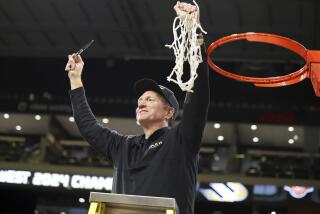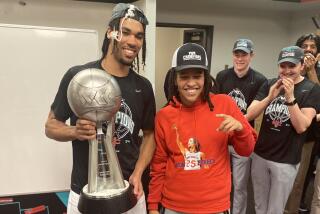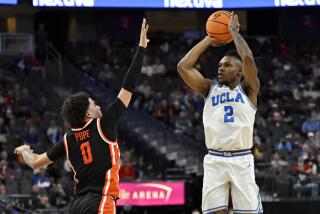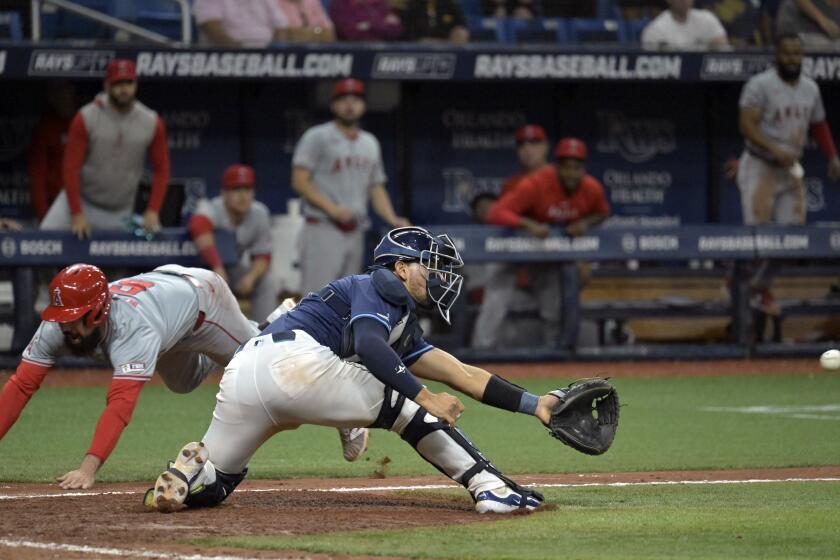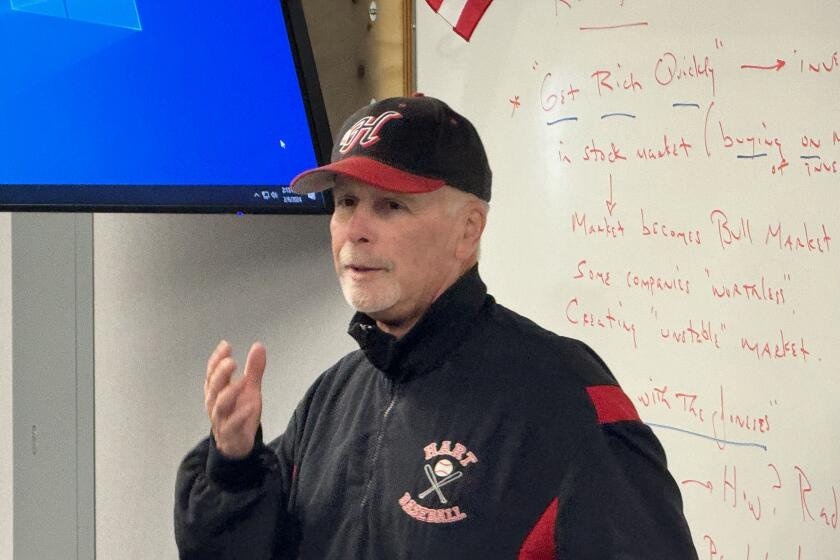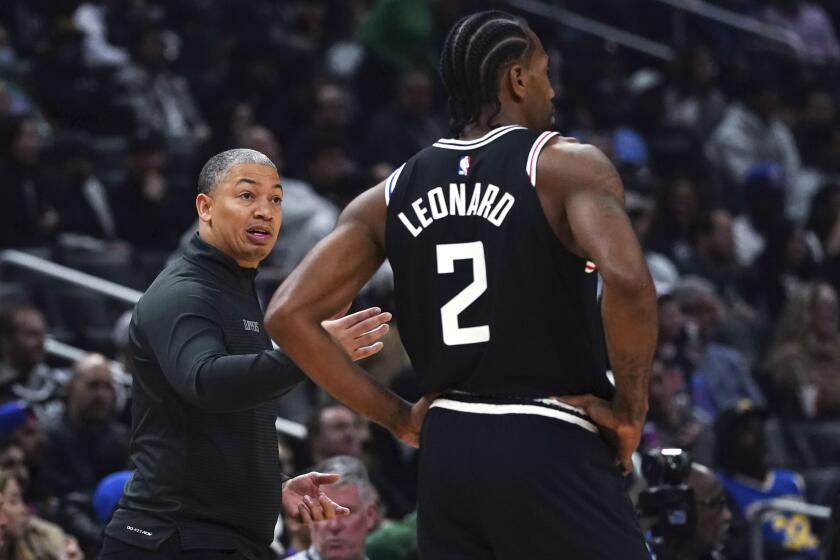A tribe’s favorite son comes up big
SOBOBA INDIAN RESERVATION, Calif. — On a cracked and weed-choked court buffeted by mountain winds and watched by coyotes, the basketballs seem to grow on trees.
The scrubby landscape in the ravine that spreads behind the rusted pole and solitary rim where Joe Burton began his journey contains old balls whose bronze leather can be seen peeking above bushes or between branches.
This is where the Oregon State senior center learned to shoot. This is where he learned to run.
“If I missed a shot and it went into the bushes, I would leave it there and go inside and get another ball,” he said. “You know, snakes.”
As the sports world braces for college basketball’s annual march to madness, this 6-foot-7, 295-pound kid with a bright red mohawk haircut reminds us that those one shining moments aren’t always found in giant arenas or on national television specials.
Sometimes they are found at an ancient Indian reservation on the eastern edges of the Inland Empire, in the backyard of a modest stucco home on a dusty street that winds through yards cluttered with rusted bits of life. Joe Burton grew up here to become the first person in the 130-year history of the reservation to receive a basketball scholarship to a major university. His family bonded together here to help him survive years of long drives and loser stereotypes in an extraordinary team effort that, this summer, will result in a college degree.
Sometimes those shining moments aren’t about victories, as Burton’s Oregon State team will probably end its season this week with an early elimination from the Pac-12 tournament. Sometimes the shining moments aren’t about numbers, even though Burton is the first Oregon State player to have a career that included at least 1,000 points, 700 rebounds and 300 assists.
Sometimes those shining moments aren’t about moments at all, but the journey. During the recent Oregon State Senior Night ceremony, Burton, his family and even his coach, Craig Robinson, were left openly sobbing.
“We hugged, I was going to pull back, but then he hugged me even more, thanked me for everything, and we both lost it,” Robinson said. “This is a wonderful story about a kid who might have never made it through, but did.”
The home of the Soboba Band of Luiseño Indians is a dozen miles from the nearest freeway, the winding road traversing green farmlands, then parched valleys, then finally passing a hulking casino remarkable in that it seems to have sprung from nowhere.
Joe Burton was like that casino. He seemingly came from nowhere, just a couple of blocks from the slots, growing up on a street whose 10 houses are owned or occupied entirely by family members. The street is named Lu N’ Lee Lane, after Burton’s great-grandparents. The area is called Silvas Flats, named after his grandfather’s family.
“That’s where his story starts,” said Ernie Salgado, a tribal elder. “With all the poverty and violence, nobody is able to leave the reservation and have such great success without being surrounded and supported by family.”
Long before Oregon State somehow discovered him, this is where Burton discovered himself, walking a few yards from his mom’s house to his grandparents’ house, hanging out in Charles and Yvonne Silvas’ backyard court. He was playing there so much he eventually just started sleeping at their home. For the first 10 years of his life, the court was not paved. Those were the toughest years, and the best years.
The dirt was so rough, he learned to handle the ball even more adroitly. The spotlight from the house was so dim, he learned a literal no-look pass. The strong San Jacinto winds taught him to shoot off balance. And the threat of snakes taught him to drive to the hoop.
“If you didn’t think you had an outside shot, you drove every time, because you couldn’t risk that ball going down the hill and into those bushes,” he said. “It was a great place to learn everything.”
And then, it wasn’t. Like many youngsters on the 700-person reservation, Burton needed to leave home to pursue his dreams. It would be no easy trip. According to the most recent NCAA diversity study, there were only four Native Americans playing Division I men’s college basketball.
“He came to me in eighth grade and said, ‘I want to play college basketball,’” recalled his mother, Dondi Silvas-Nichols. “I knew he couldn’t do it without a lot of help. I said, ‘OK, if that’s what you want, your family is here.’”
Here, and there and everywhere. For four years, several times a week, she and other family members would drive him two hours each way to downtown Los Angeles to practice with and play for club teams. She was once so tired while driving home through the inland countryside that an owl swooping across the windshield startled her back to her senses.
“I thought that may have been a sign that we were doing the right thing,” she said. “So I kept driving.”
During his high school years she even moved with him into a home near the Hemet school district so he could play for West Valley High, spending every night with him at a kitchen table watching the struggling student finish his homework.
“There would be a lot of yelling and screaming, and I would always say, ‘If you don’t want this, fine, we’ll just go back to the reservation,’” she said. “He would always grab a ball, go outside and dribble around in the dark for a while, then come back inside and finish his work.”
By the time Oregon State’s Robinson visited Burton on a recruiting trip — his first visit to a reservation — the coach was impressed with a driven kid from a despairing environment.
“I was completely taken back by the hard times there; there was an inner-city feel that I wasn’t expecting,” he said. “The people there were so proud that Joe was being recruited out of such tough surroundings.”
Robinson signed Burton but ended up getting the entire family, as his mother and grandparents immediately moved to Corvallis to spend the basketball season with him. For two years they rented a house, then the last two years they have lived in one room in a Days Inn while eating in a nearby Elmer’s family restaurant. They live off savings from previous jobs and monthly casino-revenue checks. They don’t see Burton every day, but they are there when he needs them.
Said Silvas-Nichols: “We told him we would support him throughout this process; this is the only way we know how.”
Said Burton: “They know I’m a college student, they give me my space, but to have them always here is unbelievable, I am truly blessed.”
They not only attend home games but also road games, all of them. From the time Burton started playing basketball as a child, his mother has missed just one of his games, and only because she had pneumonia.
“Our family has given him everything,” said Denise Silvas-Thomas, an aunt who also happened to be one of his first coaches. “But watching him influence so many native kids everywhere, it’s made it all worth it.”
Even living the life of modern basketball troubadours, they have remained connected to their native culture. Before every game, in arena parking lots, Burton’s mother and grandparents engage in the ancient ritual of “smudging,” in which they burn sage in hopes of warding off evil spirits. Fans walking into the game often stop and stare at the smoke-filled car, and afterward, during their postgame hug, Burton always happily comments on the sage smell coming from their clothing.
For his part, Burton wears a seashell wampum necklace everywhere but on the court, and he recently cut his hair into a mohawk and dyed it red in honor of tribal colors. To honor Burton’s heritage, Nike even outfitted the Beavers in turquoise uniforms for his last home game.
“I want native kids to know you can leave the reservation,” Burton said. “But I also want them to know that doesn’t mean you have to leave home.”
Two seasons ago, with dozens of those kids leaving the reservation to attend an Oregon State game at UCLA, Burton offered a different message. He was benched for the game after missing curfew. Afterward, he publicly confessed and apologized and warned them about the dangers of losing focus.
“I was standing next to him during that speech, and he could have blamed me, but he only blamed himself,” said Robinson. “It was such a strong moment. He has grown into such an incredible role model.”
Burton said he hopes to play professionally somewhere after graduation. The only thing that’s certain is that he said he will eventually return to Lu N’ Lee Lane, back to Silvas Flats, and occupy the tiny house that currently belongs to his mother.
“Yeah, there are balls in the bushes, but there are more in the house,” said his aunt Denise on a recent chilly afternoon on the backyard court, the wind whistling across her words. “They’ll be here when he gets here.”
twitter.com/billplaschke
More to Read
Get our high school sports newsletter
Prep Rally is devoted to the SoCal high school sports experience, bringing you scores, stories and a behind-the-scenes look at what makes prep sports so popular.
You may occasionally receive promotional content from the Los Angeles Times.
